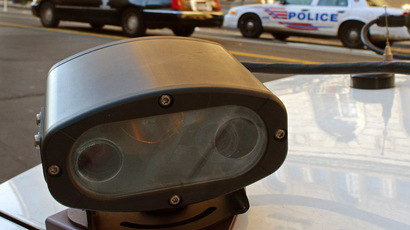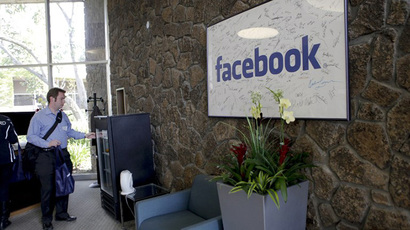Police claim Snowden leaks threaten ability to use new technologies

Police agencies have a plethora of new tools that have only recently become available due to modern technological marvels. According to some officers, though, an increasingly suspicious public is putting all of that at risk.
Law enforcement officials from around the world congregated in Philadelphia, Pennsylvania this weekend for the International Association of Chiefs of Police Conference, or IACP 2013, an annual event attended by thousands of individuals each year who are searching for a “concentrated and invaluable forum for learning, collaborating and experiencing new technology,” according to its website.
During one presentation, though, a top official cautioned his fellow cops that the pace at which agencies adopt exciting new tools could soon slow down.
While controversial new gizmos and gadgets such as drones and license plate readers have made work easier for law enforcement officials across the world, Georgia Bureau of Investigation Director Vernon Keenan said on Sunday that all of that may have been ruined by unauthorized disclosures recently made by former intelligence contractor Edward Snowden.
Reuters journalist Chris Francescani was quick to pounce on comments made during Kennan’s presentation, 'Using Social Media as an Investigative Tool,' in which the director acknowledged that Snowden’s leaking of classified National Security Agency documents has caused Americans to question tactics implemented not just by federal agencies, but also by local law enforcement.
“The scrutiny that the NSA has come under filters down to us," Francescani quoted from the presentation.
A video copy of the speech has since surfaced, thanks to
independent journalist and Philly Declaration blogger Kenneth
Lipp. The speech seems to suggest that Keenan is more than just a
little concerned over what effect Snowden’s disclosures will have
on the future of law enforcement, especially with regards to the
high-tech tools used during investigations.
At one part in his presentation, Keenan acknowledged that intelligence gathering has become extremely sophisticated in the years since the September 11, 2001 terrorist attacks. However, he suggested that a new wave of concern caused by the Snowden leaks may mean law enforcement is less likely to use everything in their arsenal - at least not without generating skepticism from the greater public.
“Since 9/11, we’ve greatly increased the ability of all of us to collect and share information - collect, share and retain information,” Keenan said. “And as we’ve been doing this, American citizens are concerned about how our abilities to use social media and how our ability to use technology are being employed.”
“I don’t think I’d be shocking anyone here to say, if you look at what is happening with the NSA today, the scrutiny they are coming under for the abilities they have to collect information, analyze information, share information - that’s their problem. But the scrutiny that they come under filters down to us, because I’m sure many of you may have been questioned by public officials in your agency if you’re doing things similar to what the NSA does.”
From there, Keenan accused “the very liberal side of the political equation” of joining with ultra-conservatives to question law enforcement’s latest tactics and in turn raising civil liberty concerns in communities where high-tech tools are used in investigations.
As those concerns grow, new rules could be forced on agencies so that investigative tools can’t be abused, Keenan said. During his presentation, he suggested that skepticism could soon keep agencies from being able to fully implement those technologies - or at least to the degree that they are used today.

“There will always be a balancing of interest between privacy and information access. That is the nature of the beast. That is not going to change. What the test is for all of us is to keep...things getting out of balance,” he said. “That there be so many restrictions in the use of social media and technology, so many restrictions because of the concerns about privacy, civil liberties, that we lose the use of that technology.”
Keenan added that he attended a meeting with the IACP investigation operations committee earlier in the week in which the public’s growing concerns about new tools were considered.
“The consensus of that committee was if we’re not very careful, law enforcement is going to lose the use of technology,” Keenan reiterated.
During another part of his presentation, Keenan acknowledged that license plate reader technology first adopted by police agencies over a decade ago is now coming under attack. Indeed, the American Civil Liberties Union just recently published a lengthy report about the devices, which has as a result only raised further questions about the possible privacy violations caused by them.
“My goodness, I came to IACP 15 years ago and they were selling license plate readers. But you look at the scrutiny that is coming into play with that now-old technology: various states are now restricting the use of law enforcement with license plate readers,” Keenan said.
“Fast forward to where we’re at here today with social media, and all of the new software products, all the new technology that is out there that can be used in social media, and they haven’t even gotten around to scrutinizing what we’re doing and what law enforcement is doing in the use of social media,” he said.
Leaks attributed to 30-year-old former NSA contractor Snowden have revealed that the intelligence community has adopted a number of tactics in secret since 9/11. Those tactics reportedly include systems in which the social media habits of innocent persons are collected and analyzed by investigators.














